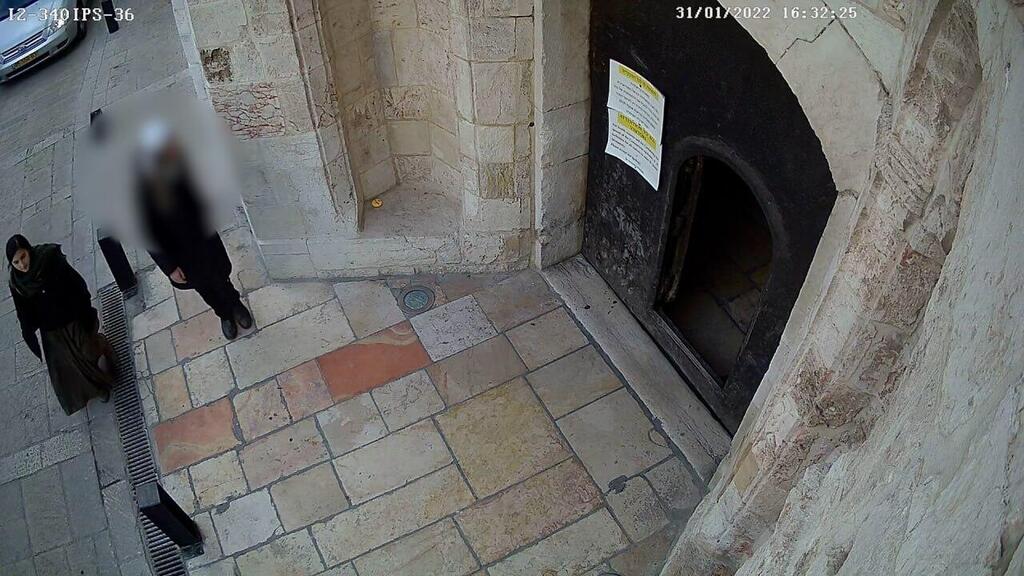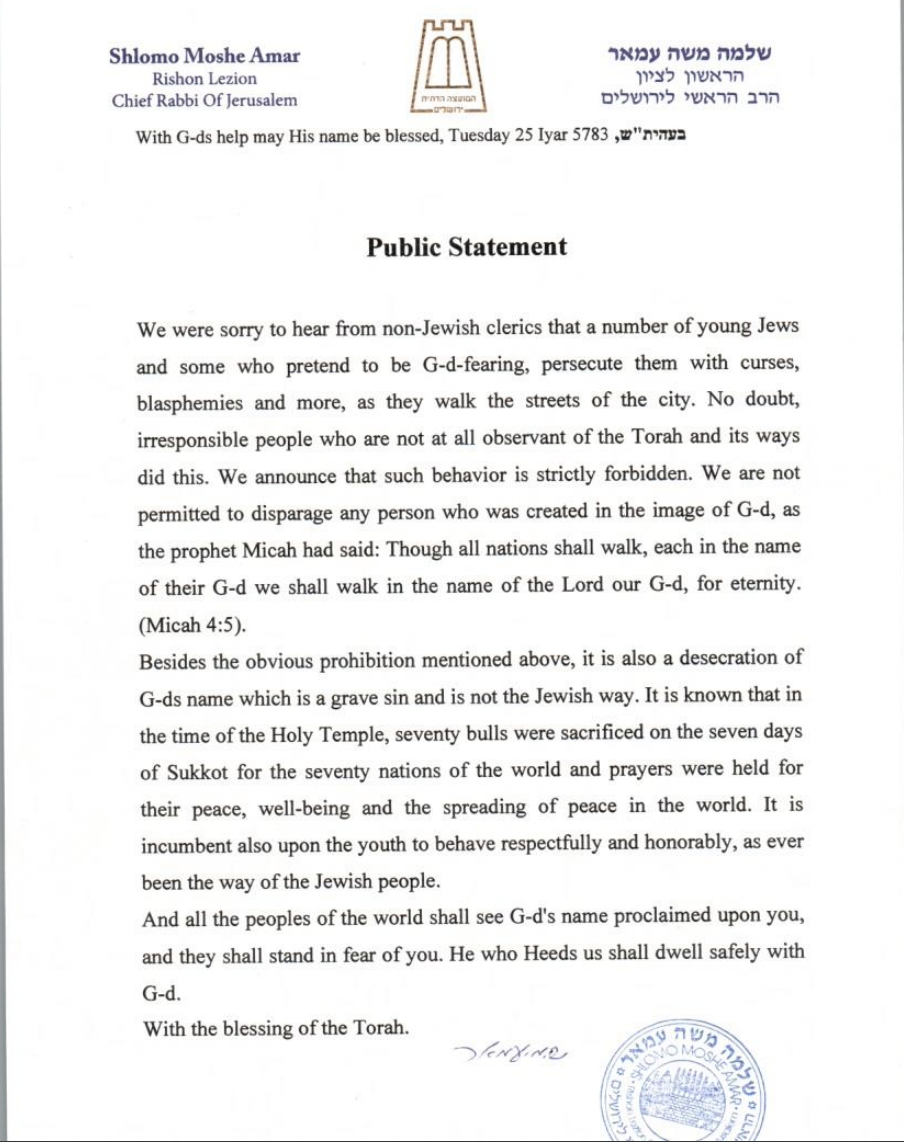Getting your Trinity Audio player ready...
A Jewish youth spits on a church in Jerusalem
Spitting Disease
In recent years, we are witnessing a growing epidemic in Jewish-Christian relations. Jews are increasingly seen spitting on Christians, on their clothes, at the entrance to their churches and monasteries, and more. We know this from surveillance cameras, first-person reports, and police records. There isn’t a single day that goes by without some form of violence expressed by Jews, typically young orthodox Jews, of different streams, both men and women, towards Christian clerics and institutions. This has become routine behavior, especially in and around the Old City of Jerusalem.
More stories:
Spitting is not trivial. Spitting on someone is considered illegal in Israel’s penal code (art. 378) and is subject to two years imprisonment when carried out on racial or religious grounds. Even spitting on the ground in front of someone, or at the entrance of a Church, is legally forbidden, and constitutes inappropriate behavior in a public place.
Yet, the practice exists and cannot be ignored. Only a few cases make their way to the courts, and police are often complacent, which leads to a decline in reporting. The problem has become an international issue, and figures regularly in international reports on Israel. As Yossi Patael, head of bureau of incoming tourism states, it is also leading to a decrease in incoming tourism. Needless to say, it also has the potential of leading to attacks on Jews outside Israel.
This past Friday, a conference was held in Jerusalem, as an attempt to raise awareness for the problem, by presenting the history of the custom and its current expressions. With the participation of the Hebrew University and the Open University, and organized by a local expert on Christianity, Yiska Harani, participants learned how 9-year-olds spit and abuse monks, how groups of yeshiva students make a habit of disrupting Christian processions, and why local Christians have despaired from police following up.
Majority-Minority Relations
Jewish-Christian relations have had their ups and downs throughout the centuries. These have been often characterized by Jew hatred, attacks on Jews, forced conversions, and more. Jews have been a minority among the Christian majority and have often had to endure abuses and violence. Spitting was part of it. Shylock, in Shakespeare’s Merchant of Venice, describes how he has been spat upon. Jews were described, beginning in the 11th century as spitting upon the cross, and often such spitting was understood, even by Jews, as a heroic act, leading to martyrdom, in the context of the Crusades. The spitting Jew became, at some point in the Middle Ages, part of the negative stereotype of the Jew. Now it is the Jews who are doing the spitting. Still, there was never a legal or halachic ground calling, or even permitting, Jews to spit upon Christians or Churches. The issue was probably never major, inasmuch as we do not find any reference in responsa and later rabbinic literature to the issue of Jews spitting upon Christians.
All this changed when a new reality was created with the formation of the State of Israel. What characterizes this new reality is the shift in majority-minority relations. This is the first time that here, in Israel, Jews are the majority, while Christians are the minority. Jews have lost interest in what happens in the Christian world, and a largely insular Jewish community of the faithful has arisen that has no relations with Christians, does not follow developments in the Christian world, and perpetuates negative attitudes to Christianity, as these were formed under earlier historical circumstances.
What this means is that religious Jews, on the whole, are unaware of developments within the Christian world. Catholic and other mainline Churches have significantly revised their theology. A theology of substitution and replacement has given way to a theology that affirms Judaism’s legitimacy and clears Jews of some of the charges that had been hurled at them for millennia, like killing the Christian messiah. Churches have asked forgiveness, are fighting antisemitism, and, on the whole, are some of Israel’s best friends. Ironically, the Churches that are being attacked are often the ones that have moved away from anti-Jewish views and that do not practice missionary activities. The spitters and attackers are, of course, clueless.
Rabbinic Responses
Following a request from the conference organizer, I turned to several rabbis and asked for their contribution to the conference, in person or otherwise. I was positively surprised by the willingness to address the issue. Within hours, Rabbi Shlomo Avnier sent me a video where he states that our struggle with Christianity is ideological, but not one of spitting. In the same way that Rabban Yohanan ben Zakkai (1st Century) instructed that one must be the first to offer shalom, even to an idolatrous non-Jew, so we too must maintain a dignified and polite relationship with Christians. Rabbi Eliezer Melamed, who has a very popular weekly column, hastened to publish a condemnation of spitting, citing the same sources that Rav Aviner did. He also cited Rabbi Abraham Isaac Kook (20th c.) that love must be extended to all, regardless of differences in religion and faith. I also spoke to his father, Rabbi Zalman Melamed, a respected teacher in religious-zionist circles. He shared with me the fact that students had approached him and asked whether one may or must spit upon Christians or their houses of worship. He, of course, instructed them it was not permissible. In other words, there is a grassroots drive to engage in such practices, that can be stemmed by rabbinic voices. Indeed, Jerusalem’s Chief Rabbi Shlomo Amar recently issued a letter condemning the practice and calling it a desecration of the divine name. I recall a similar letter being issued by then Gadol Hador (the Great of the Generation), Rabbi Elyashiv, who similarly condemned the practice. Condemnation is thus heard from various rabbinical circles. The problem, however, persists.
Is Civility Enough?
The position marshaled by Rabbis Aviner, Amar, and others is basically one that upholds civility. We will not be close spiritual friends, says Rabbi Aviner, but we ought to behave in a civil manner towards one another. Is such a perspective tenable? Perhaps it was in the diaspora when Jews were a minority. I do not think it is adequate for the task today, precisely because Jews are in a majority position. If Christians have engaged in a deep exploration of attitudinal roots and brought about change, Jews too must undertake similar religious investigations. Superficial treatment of symptoms, in the form of the messaging cited above, is not adequate for the task at hand. What is needed is treating the roots of the problem, and not only its symptoms.
This includes, in the first place, addressing ignorance on the Jewish side. Most Jews are ignorant of the diversity among Christian groups and therefore make false blanket charges against all Christians based on the actions of some groups. The great majority of Christian groups living in Israel do not engage in missionary activity. Ignorance also extends to a lack of knowledge of changes in Christian attitudes, to apologies issued by Churches, and to changes in Christian theology over the past 70 years.
Ignorance is also internal. Let me illustrate this with a letter issued by Rabbi Shlomo Amar only last week, with reference to the upcoming conference. Amar referred to Christianity, as represented in the new Citadel Museum, as idolatrous, and issued a ban on visiting the museum, which was accused of missionary work. The charges are false, but that is not the point at present. What I’d like to query is the nearly automatic association of Christianity and idolatry that is almost taken for granted by most rabbinic voices in Israel. Yet, Rabbi Amar’s own teacher, and his predecessor in the seat of Chief Rabbi of Jerusalem, Rabbi Shalom Mesas, issued a ruling that confirms an earlier Ashkenazi ruling of about 100 years ago, that permits Jewish participation in the reconstruction of churches that had been burnt down. Part of the reasoning touches on the status of Christianity as non-idolatrous. One must query what has happened that Rabbi Mesas’s view has all but been forgotten and is not part of the stock of options available to present-day rabbinic thinking. This itself is a symptom of the deeper tendencies of isolation and the erasure from the memory of important options for Jewish-Christian relations that are being sidelined as Jewish positions harden. Such hardening is one negative consequence of the change in majority-minority relations.
Rejection of the very legitimacy of Christianity, coupled with ignorance and ignoring of positive changes within mainline Christianity, while calling for civility in relations is not tenable. It is not compatible with the needs of the hour, either internationally or locally. It does not provide adequate foundations for the imagined civility that would cure social ills such as spitting disease. Relations must be more than civil. They require the kind of personal and sustained friendships that exist in the diaspora and that are the basis for new models of Jewish-Christian (and other) relations throughout the world. Indeed, throughout the world there are local interfaith councils where religious leaders meet and cultivate friendships, thereby modeling to their communities how relations ought to be practiced with members of other faiths. Jerusalem is the world’s holiest city, holy to three faiths. Yet it lacks an interreligious council. Leaders of different religions have no common forum or personal relationships. They are, in a sense, transparent to one another. How can the love across religious lines, that Rav Kook called for, be implemented when the other is transparent?
What We Need Now
One must recognize that spitting is but a symptom of deeper ills. Estrangement, ignorance, hatred, contempt, and inability to recognize change in the other are the real issues. Until Jews are able to deal with the roots of their own teaching of contempt, all attempts to deal with symptoms that emerge from these deeper ills will remain just that - symptomatic treatments that ignore the spiritual ills brewing within. The vision of universal love remains. More is needed to realize it than calls for civility. What we need now are knowledge and true friendship.






